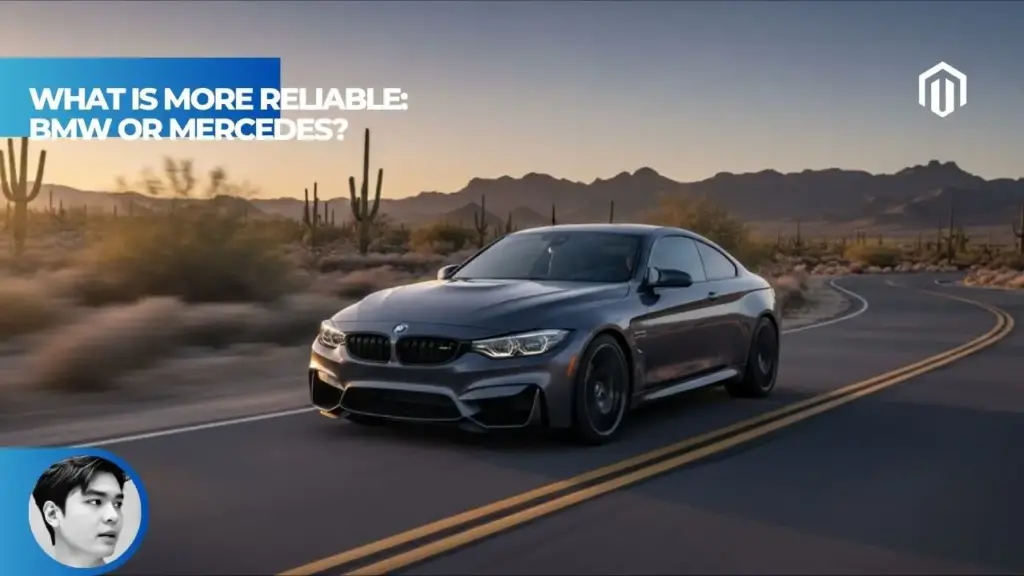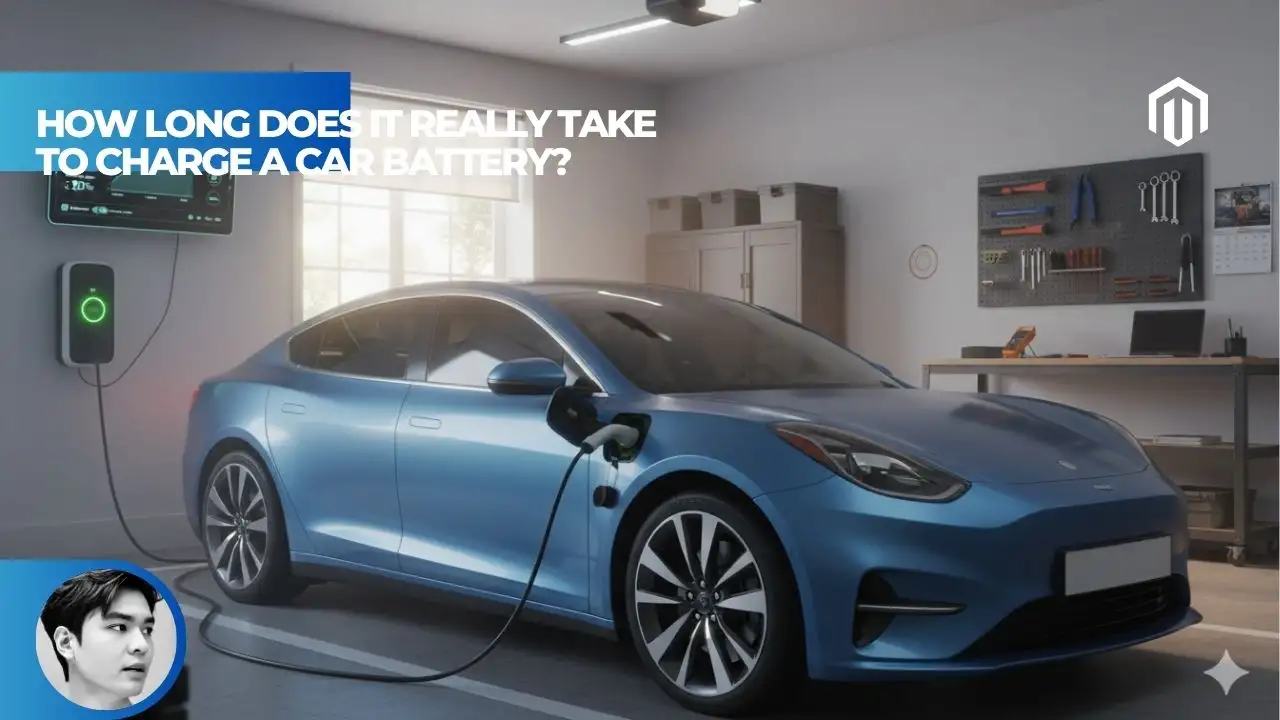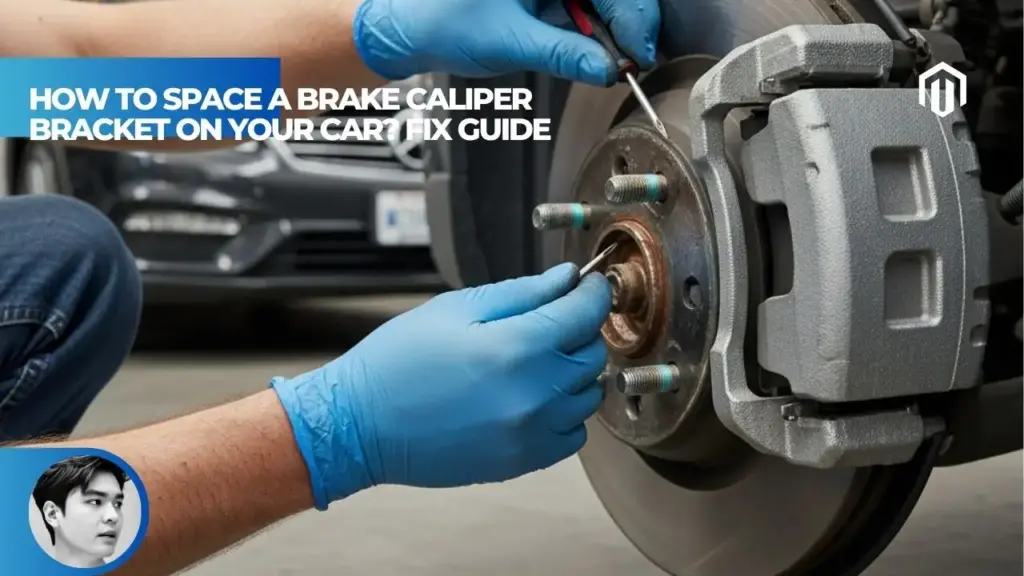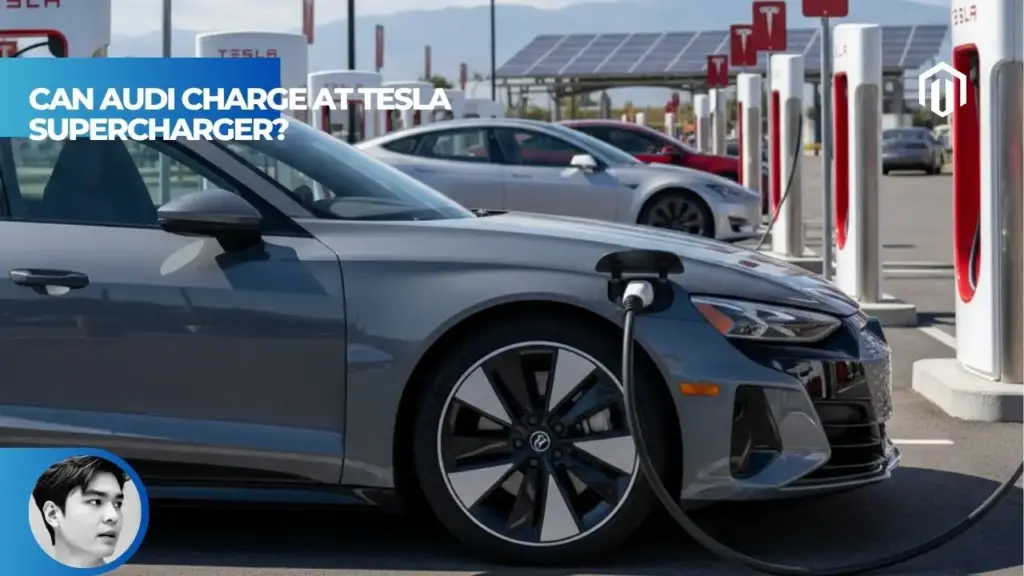You may also like:
- 【Explained】What Did BMW Start Making Before Cars? (From Planes to Cars)
- 【Explained】What’s Better: BMW M3 or M4? The Key Difference
- 【Explained】Can BMW Charge at Tesla Supercharger? The NACS Adoption Timeline Explained
- 【Explained】What Is the Difference Between a BMW X3 and X5? (A 2025 Buyer’s Guide)
- 【Explained】What Is More Expensive: BMW or Mercedes? (Cost of Ownership)
The BMW M5 CS holds the fastest real-world acceleration record at 2.6 seconds 0-60 mph, while the M4 CSL achieves the highest top speed at 191 mph among production M cars. Current production models split the crown: the M8 Competition leads in official acceleration at 3.0 seconds, but the lightweight M4 CSL claims top speed supremacy, demonstrating that “fastest” depends on your metric.
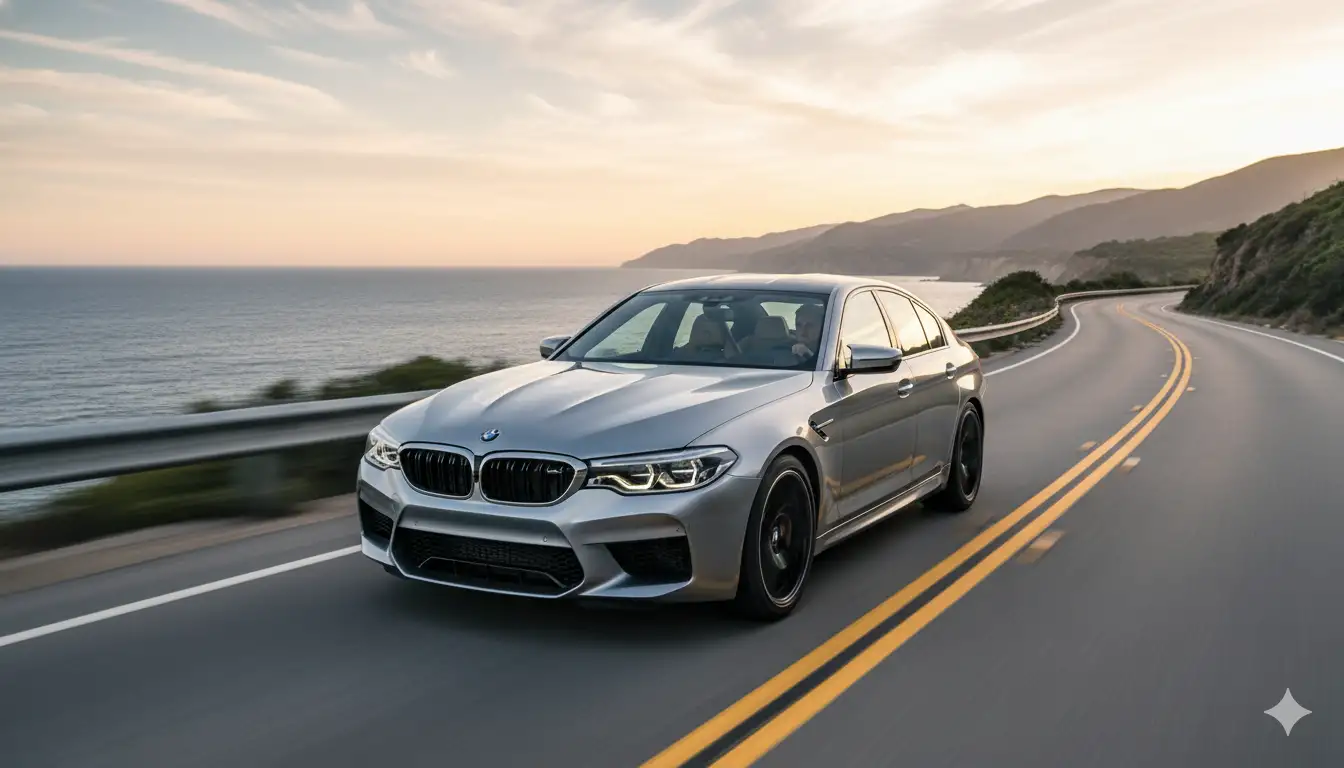
Fastest BMW M Series Overview – Acceleration vs Top Speed Champions
The quest to identify the fastest BMW M car reveals a fascinating split between acceleration dominance and top speed supremacy, with different models excelling in distinct performance metrics.
Fastest BMW 0-60 Times
The hierarchy of BMW M acceleration showcases the M5 CS achieving an astonishing 2.6 seconds 0-60 mph in real-world testing[1]. This limited-production sedan outpaces even purpose-built sports cars through sophisticated all-wheel drive traction management and 627 horsepower from its twin-turbo V8. Car and Driver’s instrumented testing confirmed this figure, making it one of the quickest sedans ever produced.
Following closely, the M8 Competition officially claims 3.0 seconds to 60 mph, though some tests have recorded times as low as 2.5 seconds under optimal conditions.
BMW M Car 0-60 Times
Comprehensive performance testing reveals the current M lineup’s acceleration hierarchy:
| Model | Official 0-60 | Real-World Best | Power (hp) |
|---|---|---|---|
| M5 CS | 3.0 sec | 2.6 sec | 627 |
| M8 Competition | 3.0 sec | 2.5 sec | 617 |
| M4 Competition xDrive | 3.4 sec | 2.8 sec | 503 |
| M3 Competition xDrive | 3.4 sec | 2.9 sec | 503 |
| M4 CSL | 3.7 sec | 3.3 sec | 543 |
Highest Top Speed BMW
Top speed leadership belongs to the BMW M4 CSL at 191 mph, electronically limited but aerodynamically capable[2]. This lightweight special edition prioritizes high-speed stability through extensive carbon fiber bodywork and track-focused aerodynamics. The CSL designation (Competition, Sport, Lightweight) reflects BMW M’s commitment to creating the ultimate high-speed weapon.
The M5 CS and M8 Competition closely follow at 190 mph with the optional M Driver’s Package.
BMW M Top Speed Leaders
According to Autvex performance analysis, the top speed hierarchy demonstrates engineering priorities:
- M4 CSL: 191 mph – Lightweight aerodynamic excellence
- M5 CS: 190 mph – Power-to-weight optimization
- M8 Competition: 190 mph – Gran Turismo supremacy
- M4 Competition: 180 mph – Balanced performance
- M3 CS: 188 mph – Track-focused dynamics
Without electronic limiters, these vehicles could theoretically exceed 200 mph based on power and gearing calculations.
Fastest Accelerating BMW M Cars
Acceleration supremacy requires more than raw power—it demands perfect traction management, optimal weight distribution, and sophisticated launch control systems.
BMW M5 CS 0-60
The M5 CS represents BMW M’s acceleration pinnacle, achieving 2.6 seconds to 60 mph through meticulous engineering[1]. Its 627-horsepower twin-turbo V8 works through an 8-speed automatic transmission and M xDrive all-wheel drive system. Weight reduction of 230 pounds versus standard M5 Competition models contributes significantly to this performance.
MotorTrend’s testing revealed quarter-mile times of 10.7 seconds at 129.7 mph, among the fastest ever recorded for a sedan.
BMW M8 Competition 0-60
The M8 Competition officially matches the M5 CS with a 3.0-second 0-60 time, though real-world testing shows potential for 2.5-second runs[3]. Its 4.4-liter twin-turbo V8 produces 617 horsepower, channeled through the same M xDrive system. The coupe’s superior aerodynamics and weight distribution contribute to consistent acceleration performance.
Launch control programming optimizes torque delivery, managing wheelspin while maximizing forward thrust through predictive traction algorithms.
BMW M4 Competition xDrive 0-60
The M4 Competition xDrive demonstrates that inline-six engines can match V8 acceleration with proper traction management[4]. Official 3.4-second times improve to 2.8 seconds in optimal conditions. The 503-horsepower S58 engine benefits from twin-turbo technology and shorter gear ratios optimized for acceleration.
All-wheel drive transforms the M4 from tire-shredding hooligan to surgical acceleration tool, though purists can still select rear-wheel drive mode.
BMW M3 CS 0-60
The upcoming M3 CS promises sub-3-second acceleration through weight reduction and power increases. Based on Competition xDrive mechanicals but incorporating CS-specific enhancements, expect approximately 540 horsepower and extensive use of carbon fiber. BMW M typically reserves CS designation for models achieving optimal power-to-weight ratios.
Historical CS models have consistently outperformed their standard counterparts by 0.2-0.3 seconds to 60 mph.
Real-World 0-60 Times BMW M
Real-world testing often beats manufacturer claims due to several factors:
- Surface preparation at test tracks
- Optimal weather conditions (60-70°F, low humidity)
- Fresh tires with proper temperature
- Multiple run averaging
- Professional drivers extracting maximum performance
Independent testing by [automotive journalists] consistently shows BMW underselling acceleration capabilities, particularly with M xDrive models.
Is the M5 CS Faster Than the M8 Competition
In pure acceleration terms, the M5 CS edges the M8 Competition despite similar power outputs[1]. The M5 CS’s 230-pound weight advantage and sedan body’s superior weight distribution contribute to its 2.6-second 0-60 time versus the M8’s typical 2.8-3.0 seconds. However, the M8 Competition’s superior aerodynamics provide advantages above 100 mph.
Quarter-mile performance further separates them: M5 CS achieves 10.7 seconds at 129.7 mph versus M8 Competition’s 11.4 seconds at 124.6 mph.
Highest Top Speed BMW M Models
Top speed achievements require different engineering priorities than acceleration, emphasizing aerodynamics, cooling capacity, and high-speed stability.
BMW M4 CSL Top Speed
The M4 CSL claims BMW M’s top speed crown at 191 mph, achieved through extensive aerodynamic optimization[2]. Carbon fiber construction reduces weight to 3,640 pounds while maintaining structural rigidity at extreme speeds. The ducktail spoiler and front splitter generate necessary downforce without excessive drag penalties.
BMW conducted extensive testing at the Nardo test track to validate high-speed stability and cooling performance.
BMW M5 CS Top Speed
Limited to 190 mph with M Driver’s Package, the M5 CS prioritizes acceleration over ultimate velocity[1]. Aerodynamic modifications include a carbon fiber rear spoiler and front splitter, balancing downforce with drag reduction. The sedan body creates more frontal area than coupes, limiting theoretical maximum speed despite abundant power.
High-speed stability remains exceptional due to the longer wheelbase and sophisticated suspension tuning.
BMW M8 Competition Top Speed
The M8 Competition reaches 190 mph when equipped with M Driver’s Package, transforming from grand tourer to autobahn missile[3]. Superior aerodynamics versus the M5 result from the sleeker coupe profile and active aerodynamic elements. The convertible version achieves similar speeds despite additional structural reinforcement weight.
Cooling capacity for sustained high-speed running exceeds other M models, reflecting grand touring priorities.
BMW M Driver’s Package Top Speed
The M Driver’s Package raises electronic limits from 155 to 190+ mph while including:
- High-speed rated tires (typically Michelin Pilot Sport 4S)
- Recalibrated stability management systems
- Enhanced cooling system mapping
- M Driver training at BMW Performance Center
- Track insurance coverage options
Package pricing typically ranges $2,500-$5,000 depending on model and market.
190 mph BMW M Car
Several M models achieve the 190 mph benchmark with appropriate options:
- M5 CS: Factory standard capability
- M8 Competition: Requires M Driver’s Package
- M5 Competition: Requires M Driver’s Package
- M6 Competition (discontinued): Achieved with package
This speed represents BMW’s confidence threshold for customer safety and vehicle durability under extreme conditions.
Unlimited Top Speed BMW
Theoretically unlimited M cars would exceed current limits based on power and gearing calculations. Engineering estimates suggest:
- M5 CS: 205-210 mph potential
- M8 Competition: 200-205 mph potential
- M4 CSL: 195-200 mph potential
These projections assume removal of electronic limitations and aerodynamic optimization for reduced drag rather than downforce.
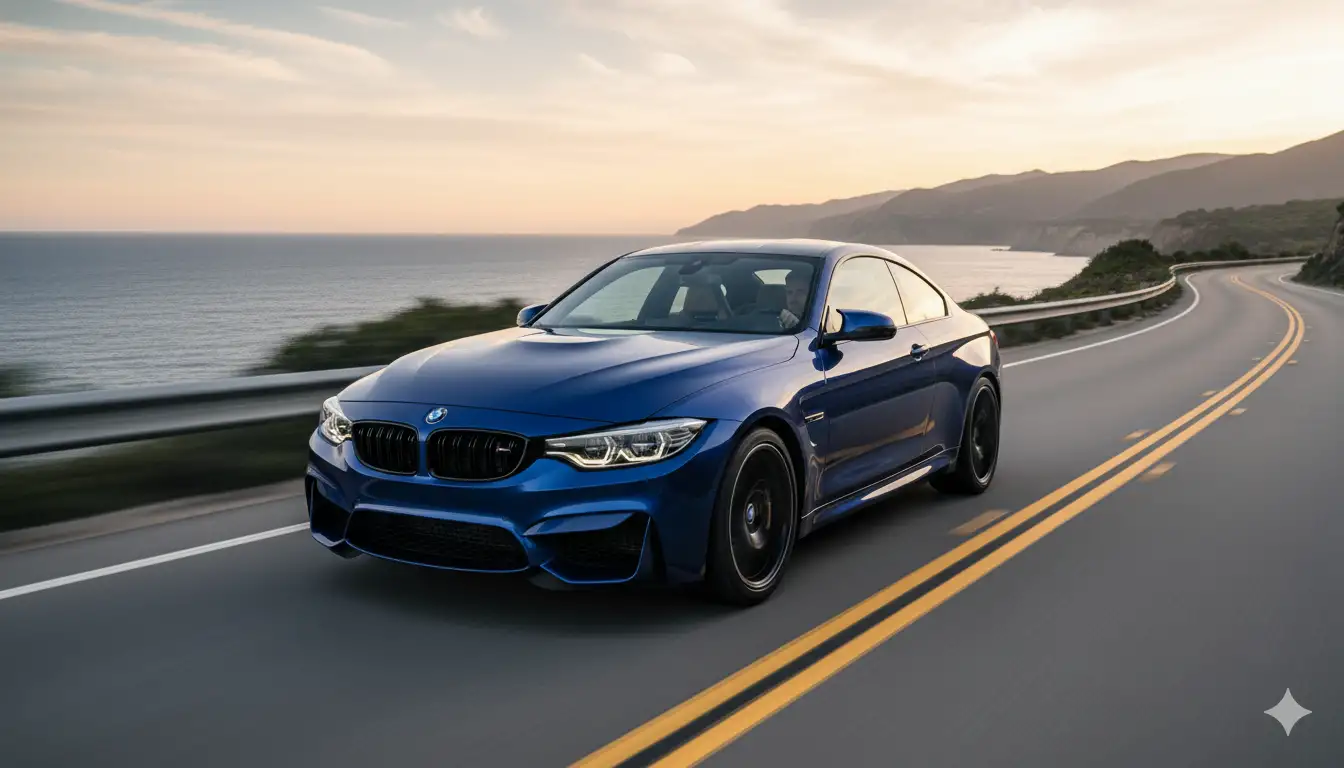
Most Powerful BMW M Car Analysis
Raw power doesn’t always translate to ultimate speed, as demonstrated by BMW’s heavyweight hybrid performance flagship.
BMW XM Label Red Horsepower
The XM Label Red generates 738 horsepower through plug-in hybrid technology, combining a twin-turbo V8 with electric assistance[5]. This represents BMW M’s highest power output ever, exceeding traditional M cars by over 100 horsepower. However, the 6,000-pound curb weight negates acceleration advantages, resulting in 3.6-second 0-60 times.
The hybrid system prioritizes torque delivery and efficiency over outright performance metrics.
BMW 738 hp Performance
Despite class-leading power, the XM Label Red’s performance falls short of lighter M cars. Quarter-mile times of 11.8 seconds at 118 mph lag behind the 627-hp M5 CS by over a second. This demonstrates that power-to-weight ratio trumps absolute power for acceleration performance.
The XM excels in different metrics like towing capacity and all-weather capability rather than track performance.
Highest Horsepower M Car
BMW M’s horsepower hierarchy reveals diverse engineering approaches:
| Model | Horsepower | Weight | Power-to-Weight |
|---|---|---|---|
| XM Label Red | 738 | 6,000 lbs | 8.13 lbs/hp |
| M5 CS | 627 | 4,089 lbs | 6.52 lbs/hp |
| M8 Competition | 617 | 4,400 lbs | 7.13 lbs/hp |
| M4 CSL | 543 | 3,640 lbs | 6.70 lbs/hp |
Power-to-weight calculations explain why the M5 CS accelerates fastest despite lower peak power.
BMW M TwinPower Turbo V8
The S63 engine family powers BMW’s fastest M cars through sophisticated forced induction. Twin-scroll turbochargers positioned in the valley between cylinder banks minimize lag while maximizing thermal efficiency. Variable valve timing and direct injection optimize power delivery across the rev range.
According to Autvex technical analysis, this engine architecture balances performance with emissions compliance better than larger displacement alternatives.
BMW S68 Engine
The newer S68 engine in the XM and latest M5 adds mild hybrid assistance to traditional twin-turbo V8 architecture. While producing more power, added complexity and weight compromise pure performance metrics. The 48-volt electrical system enables features like electric turbo anti-lag but adds approximately 200 pounds.
Future M cars will likely adopt this technology despite current performance penalties.
M HYBRID System
BMW’s M Hybrid technology in the XM combines:
- 4.4-liter twin-turbo V8 (483 hp)
- Electric motor (194 hp)
- 25.7 kWh battery pack
- Combined system output up to 738 hp
While revolutionary for efficiency, the system’s weight penalty currently prevents class-leading acceleration or top speed performance.
Specific Model Performance Comparisons
Direct comparisons between M models reveal how different engineering priorities affect real-world performance metrics.
BMW M5 Competition vs M8 Competition
Comparing the M5 and M8 Competition models reveals subtle but significant differences[1]. Both share the S63 twin-turbo V8 producing 617 horsepower, but weight and aerodynamics differentiate performance:
- M5 Competition: 4,370 lbs, 0-60 in 3.2 seconds, 189 mph top speed
- M8 Competition: 4,400 lbs, 0-60 in 3.0 seconds, 190 mph top speed
The M8’s superior weight distribution and lower center of gravity enable quicker acceleration despite being heavier.
What Is the Fastest M3
The fastest M3 currently is the Competition xDrive achieving 2.9-second 0-60 times in testing[4]. The upcoming M3 CS promises to lower this further through weight reduction and power increases. Historical context shows dramatic evolution:
- E30 M3 (1986): 6.7 seconds
- E46 M3 (2001): 4.8 seconds
- F80 M3 (2015): 3.9 seconds
- G80 M3 Competition xDrive (2021): 2.9 seconds
Each generation roughly halves its predecessor’s acceleration time through technological advancement.
What Is the Fastest M4
The M4 CSL currently claims fastest M4 status through top speed supremacy at 191 mph[2]. However, the M4 Competition xDrive accelerates quicker to 60 mph. This split demonstrates different definitions of “fastest”:
- Acceleration: M4 Competition xDrive (2.8 seconds 0-60)
- Top Speed: M4 CSL (191 mph)
- Nürburgring: M4 CSL (7:20.2)
Track performance often favors lightweight CSL despite lower acceleration figures.
Fastest BMW in 2024
For 2024 model year vehicles, the M8 Competition Coupe claimed fastest current production status with 3.0-second 0-60 times. The M5 CS had ceased production, making the M8 BMW’s acceleration leader among available models. Entry-level M models like the M2 still provided impressive performance at lower price points.
Fastest BMW in 2025
The 2025 model year brings the new G90 M5 with 717 hybrid horsepower but increased weight[6]. Despite power gains, the 5,400-pound curb weight results in 3.5-second 0-60 times, slower than its predecessor. The M8 Competition remains the fastest accelerating model available for 2025 purchase.
Future CS variants promise to restore M5 acceleration supremacy through weight reduction strategies.
Fastest M SUV
The X5 M Competition holds fastest M SUV honors with 3.7-second 0-60 acceleration. Despite weighing over 5,400 pounds, the 617-horsepower V8 and intelligent all-wheel drive enable sports car acceleration. The X6 M Competition matches these figures with identical mechanicals in a “coupe” SUV body.
The XM Label Red’s superior power cannot overcome its substantial weight penalty in acceleration contests.
BMW M Performance Context and Value
Understanding performance metrics requires context about pricing, availability, and real-world usability of these extreme machines.
Fastest BMW for the Money
Value-conscious performance seekers find the M3 Competition offers best bang-for-buck at approximately $80,000 base price. With 2.9-second 0-60 capability, it nearly matches six-figure M cars’ acceleration. The rear-wheel drive M4 provides similar thrills at slightly lower cost but sacrifices all-weather capability.
Certified pre-owned M5 Competition models offer exceptional value, providing supercar performance under $100,000.
Fastest Street-Legal BMW
All current M production models remain fully street-legal with required safety equipment and emissions compliance. The M4 CSL, despite track focus, includes:
- Full lighting systems
- Airbags and safety structures
- Catalytic converters
- Street-legal tires
- Registration capability in all 50 states
Track-only BMW M4 GT3 race cars achieve higher performance but lack street legality.
Fastest Production BMW
The title of fastest production BMW requires qualification:
- Acceleration: M5 CS at 2.6 seconds 0-60 (limited production)
- Top Speed: M4 CSL at 191 mph (current production)
- Nürburgring: M4 CSL at 7:20.2 (current production)
Limited production models like the M5 CS blur lines between regular and special editions.
Price of the Fastest BMW
Acquiring BMW’s fastest requires substantial financial commitment:
- M5 CS: $142,000 (discontinued, appreciating)
- M4 CSL: $140,000 (limited availability)
- M8 Competition: $139,000 (readily available)
- XM Label Red: $185,000 (highest MSRP)
These prices exclude options, destination charges, and dealer markups for limited editions.
BMW M Series List 0-60
Comprehensive M model acceleration rankings:
- M5 CS: 2.6 seconds
- M8 Competition: 3.0 seconds
- M3/M4 Competition xDrive: 3.4 seconds
- M4 CSL: 3.7 seconds
- X5 M Competition: 3.7 seconds
- M2: 3.9 seconds
- X3 M Competition: 3.9 seconds
- M340i xDrive: 3.8 seconds (not full M)
What Does CS and CSL Mean on a BMW
BMW’s special designations carry specific meaning and heritage:
- CS: Competition Sport – Enhanced performance, limited production
- CSL: Competition Sport Lightweight – Maximum weight reduction, track focus
These badges trace back to 1970s homologation specials, representing BMW M’s most focused offerings. Modern CS models typically remove 200+ pounds while adding power, while CSL variants pursue maximum weight reduction through extensive carbon fiber use.
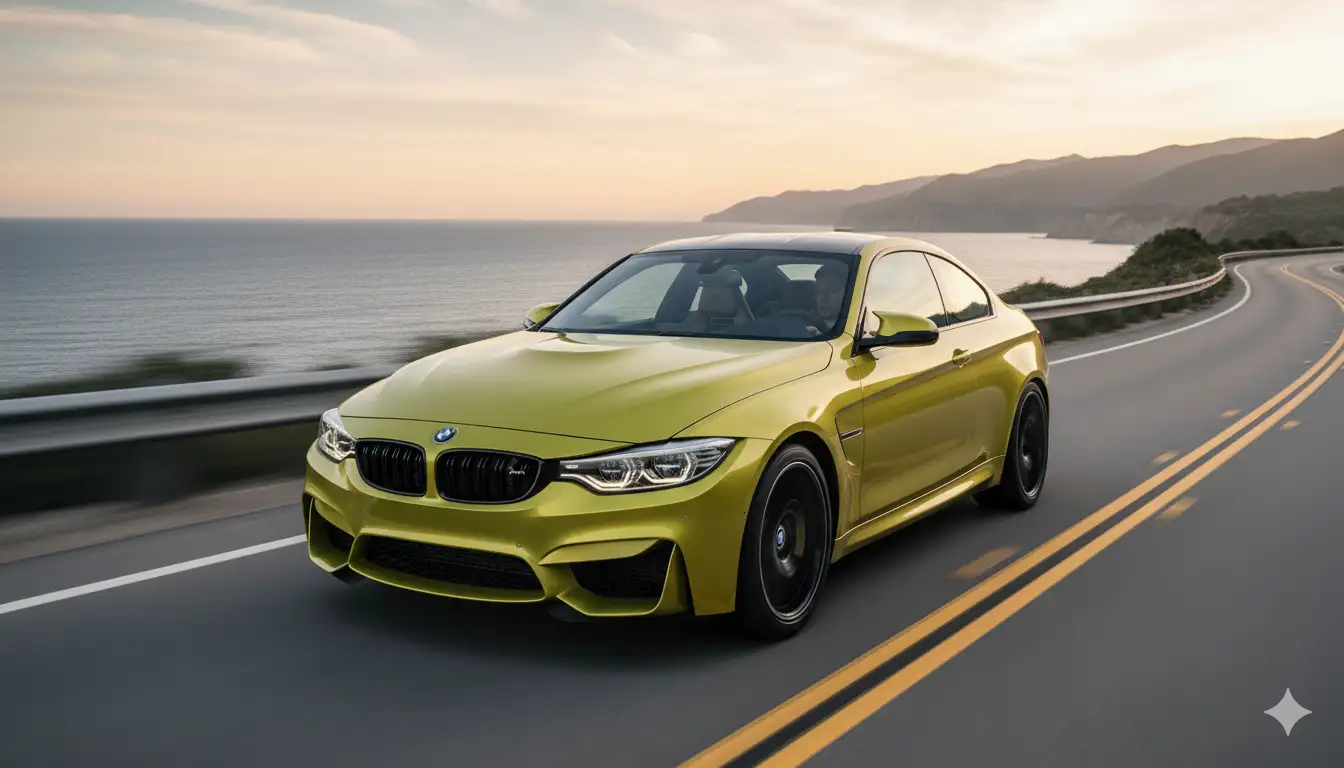
Key Takeaway
The BMW M5 CS holds the fastest real-world acceleration at 2.6-2.9 seconds 0-60 mph, while the M4 CSL achieves the highest top speed at 191 mph. Among current production models, the M8 Competition officially leads acceleration at 3.0 seconds 0-60, demonstrating the split between acceleration and top speed champions.
Key Points:
- M5 CS achieves fastest 0-60 at 2.6 seconds
- M4 CSL reaches highest top speed at 191 mph
- M8 Competition leads current production acceleration
- XM Label Red has most power (738 hp) but isn’t fastest
- M Driver’s Package essential for 190+ mph capability
- Power-to-weight ratio beats absolute power
- Real-world times often beat official claims
Next Steps
Compare specific M models based on your priorities—acceleration for street performance or top speed for track days. Consider the M Driver’s Package ($2,500-5,000) for raised speed limits if you have access to appropriate venues. Test drive both M8 Competition and M3/M4 Competition xDrive models to experience different acceleration delivery styles.
Research certified pre-owned M5 CS models if seeking ultimate acceleration, though expect appreciation above MSRP. Factor in tire replacement costs ($2,000+ per set) for maintained performance. Consider attending BMW Performance Center delivery for M Driver’s Package training and safe exploration of capabilities.
Frequently Asked Questions
What is the fastest BMW M series car in 2024?
The M8 Competition is the fastest current production M car with 0-60 in 3.0 seconds officially, reaching 190 mph with M Driver’s Package.
What is the fastest accelerating BMW M car from 0-60?
The BMW M5 CS achieves the fastest acceleration at 2.6-2.9 seconds 0-60 in real-world testing.
Is the BMW M5 CS the fastest M car ever?
For acceleration yes (2.6 seconds 0-60), but the M4 CSL holds the highest top speed at 191 mph.
What is the highest top speed of any BMW M car?
The BMW M4 CSL reaches 191 mph, the highest of any production BMW M model.
Is the BMW M8 Competition faster than the M5 Competition?
The M8 Competition is slightly quicker in acceleration (3.0 vs 3.3 seconds) with similar top speeds.
How fast is the BMW M4 CSL?
The M4 CSL accelerates 0-60 in 3.7 seconds and reaches 191 mph top speed.
Is the BMW XM Label Red the fastest M car?
No, despite 738 hp it’s slower at 3.6 seconds 0-60 due to weight; not the fastest.
What is the most powerful BMW M car?
The BMW XM Label Red with 738 horsepower is the most powerful production M model.
What does CS and CSL mean on a BMW?
CS means Competition Sport, CSL means Competition Sport Lightweight—special high-performance variants.
What is the M Driver’s Package?
An option that raises the electronic speed limiter from 155 mph to 190 mph and includes performance driving training.
What is the fastest M3 model?
The M3 Competition xDrive with 0-60 in 3.4 seconds officially, some achieving 2.8 seconds in testing.
What is the fastest M car you can buy right now?
The M8 Competition Coupe, offering 3.0-second 0-60 acceleration and 190 mph top speed capability.
References
- MotorTrend. (2025). Blazing Bimmers: The 10 Fastest BMWs MotorTrend Has Ever Tested. https://www.motortrend.com/features/fastest-bmw
- BMW Group Press. (2022). The all-new BMW M4 CSL Technical Specifications. https://www.press.bmwgroup.com/global/article/attachment/T0386533EN/613139
- TopGear. (2023). BMW M8 Competition Long Term Review. https://www.topgear.com/long-term-car-reviews/bmw/m8/report-1
- BMW Blog. (2024). 2025 BMW M4 Is Seriously Quick In Acceleration Test. https://www.bmwblog.com/2024/05/16/2025-bmw-m4-is-seriously-quick-in-acceleration-test/
- BMW USA. (2025). BMW XM Label Red Specifications. https://www.bmwusa.com
- Car and Driver. (2025). 2025 BMW M5 Adds 100 HP but Isn’t Any Quicker in Our Tests. https://www.caranddriver.com/news/a63787388/2025-bmw-m5-test-results/

I am a senior automotive analyst at Autvex. Expert vehicle evaluations, in-depth reviews, and objective analysis helping readers make informed automotive decisions with years of industry experience.

